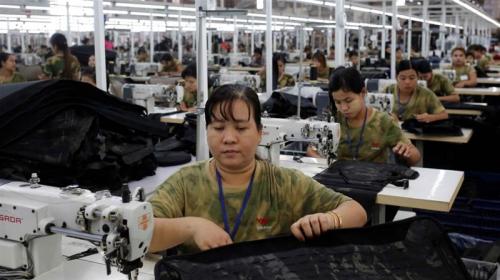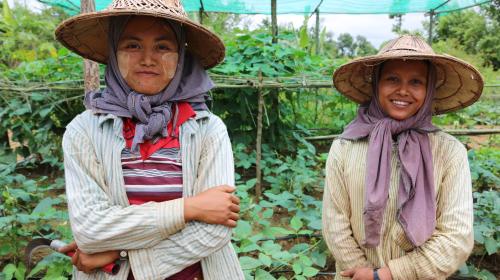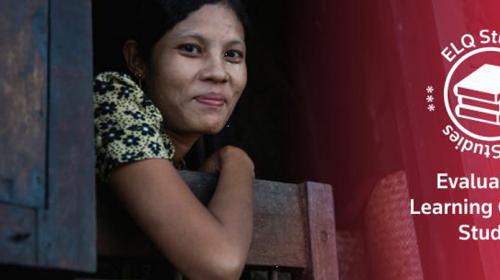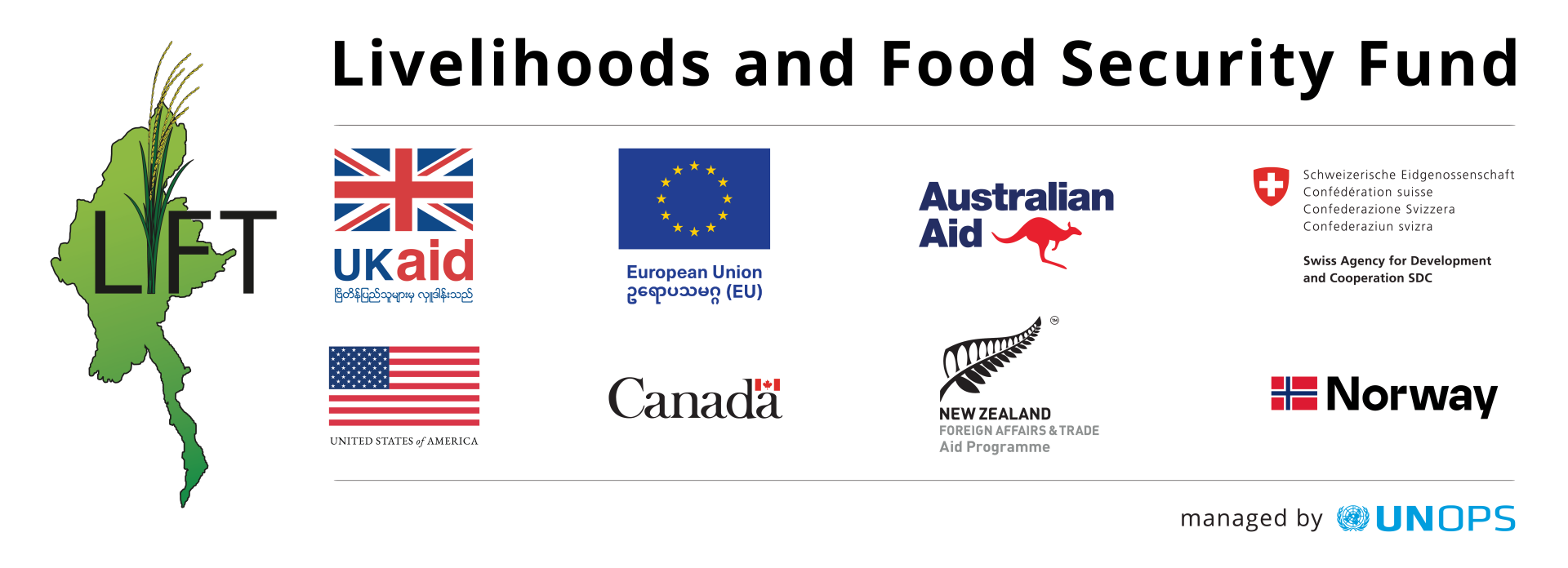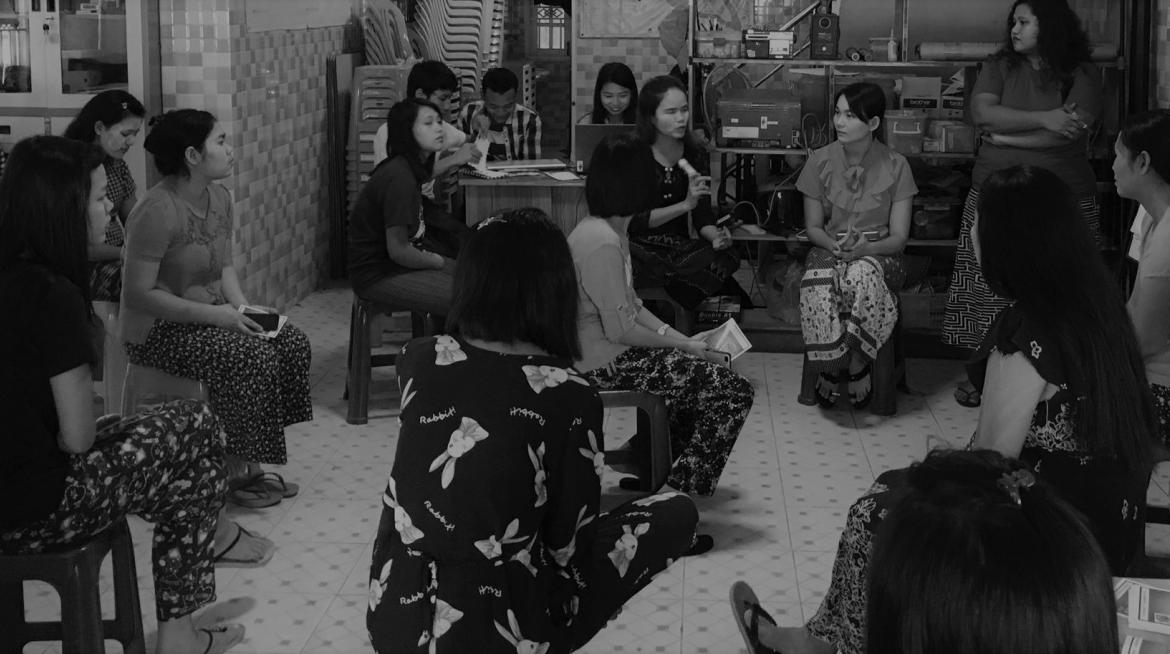
(Myanmar version below)
In the past two years, women garment sector workers have transitioned from being invisible and unempowered workers to leading labour rights activists. As employment and migration opportunities are shut down, however, so are the opportunities for these women to earn a livelihood and support their families. LIFT remains committed to supporting projects that invest in the resilience of these women despite the changing political, social and economic landscape.
Pre-COVID-19 the garment sector employed 700,000 workers, 80% of whom were women
In the past few years the garment manufacturing sector has become a significant source of employment for women in Myanmar; a critical contribution in a country where women are 30% less likely than men to be in the labour force. Women in the sector are largely internal migrants and played an active role in Myanmar’s transition from a rural to urban economy. Work in garment, textile and footwear factories can, however, be fraught with challenges. Many internal migrants take out significant loans to facilitate their migration, working conditions within garment factories remain largely unregulated and wages can be relatively low for long, often excessive hours. Even so, the increasing external focus on Myanmar’s garment sector attracted efforts to improve ethical business practices and at the same time, LIFT and partners have worked to strengthen worker empowerment and labour organising initiatives.
COVID-19 had a significant impact on the garment industry
COVID-19 resulted in supply chain disruptions and cancellations of orders that culminated in a significant slow down of the garment sector in 2020 - at that point worth around US $4.6billion. A reported 75% decline in orders meant that many garment workers lost their jobs. This heightened the vulnerability of garment workers in some of Myanmar's most vulnerable communities in peri-urban areas, already characterised by poor nutrition, hygiene and housing, with one survey finding over a quarter of women garment workers to be undernourished. COVID-19 related loss of livelihoods exacerbated the challenges in accessing nutritious foods and many households resorted to taking on unsustainable levels of debt to support themselves. During this time LIFT partners worked to support factories to shift production to masks, and continued providing skills development training for garment sector workers to improve their employment options through and post-pandemic as well as providing direct support to garment factory workers.
Women’s labour organizing in the garment sector has been on the rise
In spite of the multiple challenges facing women garment factory workers, their labour organizing has been on the rise, making them one of the most organized groups of workers in the country. Myanmar only started allowing workers to legally organize in 2012 and since then unions have been established from the ground up, with women’s labour organizing in the garment sector taking a significant role. In the past two years alone, garment workers have taken to the streets in their thousands to demand better pay, protest the unlawful firing of union leaders, and to challenge COVID-related lay-offs. LIFT and partners have supported this strengthened labour rights movement as a critical part of a decent work environment, partnering with civil society, labour rights activists and unions to provide support to workers to resolve collective labour disputes and strengthening the peer networking of garment workers.
Women garment workers played a key role resisting the coup
On 1 February, the military coup saw thousands of Myanmar citizens taking to the streets as part of a national civil disobedience movement (CDM). Women garment factory workers were at the front and centre of this resistance, using the skills developed in organizing workers, whilst leveraging the attention of international fashion brands. The CDM has been met by the military with brutal and deadly force with the death toll currently reaching 782 lives lost, a tragic example is the shooting of a women garment factory worker, who had led a group of workers to a factory to claim for unpaid wages following the coup. The military intervened and after shooting her, proceeded to arrest the remaining 70 workers and kill five further people when shooting into the crowd. Violence and instability has also resulted in factories being set alight and several large brands sourcing from Myanmar announcing that they would stop all further orders.
As the military cracks down on dissenting voices, workers call on brands to come to their aid
The military response to the CDM and worker resistance has been an unforgiving and relenting crackdown on dissenting voices, with authorities heavily targeting worker organizations and labour rights activists in their attempt to suppress the growing power of the labour movement. This has included the rendering of multiple labour unions as illegal and the arbitrary arrest and detention of countless labour activists and union leaders. It is estimated that 3,700 people are in detention and that women make up 40% of those arrested. There are now multiple documented reports of women being beaten, tortured and sexually assaulted in detention. Despite this, women garment factory workers continue to call on international brands to hold the factories to account for worker rights and unpaid wages, and to make clear that any halt in orders is due to opposition to the military coup, and not logistical issues.
The strength of the resistance obscures the desperation of the reality
The further shock to livelihoods as a result of the coup has rendered households in peri-urban areas unable to meet their basic needs. Accumulation of new debt is rising as half of the factories and business in the area are not operational. Reports indicate that as many as 70% of internal migrants who had lost their jobs left the cities and returned to their rural homelands, many to Rakhine and Ayeyarwady. Yet many of these rural homes are already in conflict-affected areas reliant on remittances from workers in employment in the cities and overseas. Banking challenges have compounded the loss of remittance from internal migrants, with rural households also facing the difficulties accessing remittances from overseas.The reduction in income in remittance reliant households has meant that home communities have little to offer those who return. LIFT and partners have adjusted programming to meet the emergency needs of those who remain in peri-urban spaces and those increasingly vulnerable migrants on the move, providing cash and food assistance as well as psychosocial support where possible, reaching more than 5,000 individuals to date and ensuring that migrant women are included in the targeting, specifically those who are head of their household, pregnant or single mothers.
A vulnerable migrant population face decreasing migration options
With limited employment opportunities in rural homelands, and with families reliant on them for money, women garment factory workers along with other internal migrant workers are on the move again. Some are returning to the cities to seek work in the few factories that remain operational. For those who succeed, continued curfews have put a limitation on available working hours and wages. In the absence of opportunities in the cities, many are looking to neighbouring countries for opportunities. Reports indicate that thousands have crossed the border into Thailand and India. In the face of a significant COVID-19 wave, however, the opportunities to enter these countries and access the labour market are increasingly limited. Indeed, indications are that both Thailand and India will likely take a hostile approach to migrants and refugees seeking to escape the Myanmar coup. The result being that there is a population of women garment factory workers and other vulnerable migrant workers, who are faced with limited options in an increasingly volatile situation.
LIFT remains committed to providing continued support to migrants and other vulnerable workers
In addition to adjusting its project work to ensure that there is an emergency response to the immediate needs of households, LIFT recognises that there is a critical need to maintain the space for interventions that support the employment, employability and labour rights of women and men migrants and other vulnerable workers. LIFT continues to work with partners to identify ways to provide information, training and support services to migrant workers and to ensure protection of vulnerable workers who are at risk of, or have been subject to violence, forced labour or trafficking. This includes access to legal assistance, shelter and support and advice on safe migration and the risks of trafficking.
More must be done to protect labour rights
Myanmar’s women garment sector workers have already demonstrated strength, creativity and resilience in the actions they have taken to support their families, workers, communities and country. There is no doubt they will continue to demonstrate these qualities as the situation unfolds. It is imperative that they are supported in their role as breadwinners and as labour rights activists and that donors and international brands call on Myanmar to protect labour rights, cease violence, and end arbitrary arrests and detention.
.........................................................
(Myanmar version)
အထည်ချုပ်စက်ရုံများမှ အမျိုးသမီး အလုပ်သမားများ - လျှောက်လှမ်းကျော်ဖြတ်ခဲ့ရသော ခရီးလမ်းနှင့် ရှေ့ဆက်ရမည့် အနာဂတ်
လွန်ခဲ့သည့် နှစ်နှစ်အတွင်းတွင် အထည်ချုပ်ကဏ္ဍမှ အမျိုးသမီး အလုပ်သမားများသည် လျစ်လျူရှုခံရပြီး လုပ်ကိုင်နိုင်စွမ်းမရှိသည့် အလုပ်သမားများ အဖြစ်မှ အလုပ်သမားအခွင့်အရေးများအတွက် ဦးဆောင်လှုပ်ရှားသူများအဖြစ် သို့ တစ်စထက် တစ်စ ပြောင်းလဲ တိုးတက်လာခဲ့ပြီး ၂၀၂၁ ခုနှစ် စစ်တပ်၏ အာဏာသိမ်းမှုအား ဆန့်ကျင် တွန်းလှန်ရာတွင် အများ အာရုံစိုက်ခြင်း ခံရသည့် အဆင့် သို့ ရောက်ရှိလာခဲ့ကြပါသည်။ သို့သော်လည်း အလုပ်အကိုင်ခန့်ထားခြင်း နှင့် ရွှေ့ပြောင်း သွားလာမှု ဆိုင်ရာ အခွင့်အလမ်းများ ရပ်ဆိုင်းသွားသောကြောင့် အဆိုပါ အမျိုးသမီးများအနေဖြင့် အသက်မွေးဝမ်းကျောင်းမှုအတွက် ဝင်ငွေ ရရှိရန် နှင့် ၎င်းတို့၏ မိသားစုများအတွက် ထောက်ပံ့ပေးနိုင်ရန် အခွင့်အလမ်းများ ဆုံးရှုံးနေကြပါသည်။ LIFT အနေဖြင့် နိုင်ငံရေး၊ လူမှုရေးနှင့် စီးပွားရေးဆိုင်ရာ အခြေအနေများ ပြောင်းလဲသွားသော်လည်း အဆိုပါ အမျိုးသမီးများ၏ ကြံ့ကြံ့ခံနိုင်စွမ်းတည်ဆောက်ရေးတွင် ရင်းနှီးမြှုပ်နှံထားသည့် စီမံချက်များအား ဆက်လက် ပံ့ပိုးပေးသွားမည်ဟု ဆုံးဖြတ်ထားပြီး ဖြစ်ပါသည်။
COVID-19 ကပ်ရောဂါ မဖြစ်ပွားမီက အထည်ချုပ်ကဏ္ဍတွင် အလုပ်သမား ၇၀၀,၀၀၀ အလုပ်ခန့်ထားနိုင်ခဲ့ပြီး ယင်းတို့ အနက်မှာ ၈၀% မှာ အမျိုးသမီးများ ဖြစ်ကြပါသည်။
လွန်ခဲ့သည့် နှစ်အနည်းငယ်အတွင်းတွင် အဝတ်အထည်ထုတ်လုပ်သည့် ကဏ္ဍသည် မြန်မာနိုင်ငံရှိ အမျိုးသမီးများအား အလုပ် အကိုင် ခန့်ထားရာတွင် အရေးပါသည့် ရင်းမြစ်တစ်ခု ဖြစ်လာခဲ့ရာ လုပ်သားအင်အားစုတွင် အမျိုးသမီးများ သည် အမျိုးသား များထက် ၃၀% နီးပါး လျော့နည်းနေသည့် နိုင်ငံတစ်နိုင်ငံအတွက် ဤသို့ဖြစ်ထွန်းလာမှုမှာ အရေးပါသည့် အချက် ဖြစ်ပါသည်။ ဤကဏ္ဍတွင် အမျိုးသမီး အများစုမှာ ပြည်တွင်း ရွှေ့ပြောင်းသွားလာသူများ ဖြစ်ကြပြီး ကျေးလက်စီးပွားရေးမှ မြို့ပြ စီးပွားရေး သို့ အသွင်ကူးပြောင်းရာတွင် ထိရောက်သည့် အခန်းကဏ္ဍမှ ပါဝင်လျက်ရှိပါသည်။ အထည်ချုပ်၊ အထည် အလိပ်နှင့် ဖိနပ် စက်ရုံများတွင် လုပ်ကိုင်နိုင်ကြသော်လည်း စိန်ခေါ်မှုများ ပြည့်နှက်နေပါသည်။ များစွာသော ပြည်တွင်း ရွှေ့ပြောင်းသွားလာသူများသည် ၎င်းတို့ ရွှေ့ပြောင်းသွားလာမှုတွင် အထောက်အပံ့ဖြစ်စေရန်အတွက် ချေးငွေ အများအပြား ရယူကြပါသည်။ အထည်ချုပ် စက်ရုံများအတွင်း လုပ်ငန်းခွင် အခြေအနေမှာ များသောအားဖြင့် စည်းမျဉ်းစည်းကမ်းထိန်းချုပ်မှု ကင်းမဲ့နေပြီး အလုပ်ချိန် ကြာမြင့်ခြင်း၊ မကြာခဏ ဆိုသလို အချိန်ပိုလုပ်ကိုင်ရခြင်းတို့ ရှိသော်လည်း လုပ်ခလစာမှာ အလွန်နည်းပါး ပါသည်။ သို့ရာတွင် မြန်မာ့ အထည်ချုပ်ကဏ္ဍအပေါ် ပြင်ပမှ အာရုံစိုက်မှုများ မြင့်တက်လာခဲ့ရာ စီးပွားရေး ကျင့်ဝတ်ဆိုင်ရာ အလေ့အကျင့်များ တိုးတက် ကောင်းမွန်လာစေရန် အတွက် ကြိုးပမ်းအားထုတ်မှုများ ပြုလုပ်ရန် ဆွဲဆောင်နိုင်ခဲ့ပါသည်။ တချိန်တည်းမှာပင် LIFT ၏ မိတ်ဖက်အဖွဲ့အစည်း များသည် အလုပ်သမားများ၏ လုပ်ကိုင်နိုင်စွမ်း နှင့် အလုပ်သမား အဖွဲ့အစည်းများ ခိုင်မာအားကောင်းစေရေးတို့အတွက် လုပ်ကိုင် ဆောင်ရွက်နေ ပါသည်။
COVID-19 ကပ်ရောဂါသည် အထည်ချုပ်လုပ်ငန်းအပေါ် သိသာထင်ရှားသည့် သက်ရောက်မှု ရှိခဲ့ခြင်း
၂၀၂၀ခုနှစ်တွင် ကန်ဒေါ်လာ ၄.၆ ဘီလျံ တန်ဖိုးရှိသည့် အထည်ချုပ်ကဏ္ဍမှာ COVID-19 ကပ်ရောဂါကြောင့် ထောက်ပံ့ရေး ကွင်းဆက်များ ပြတ်တောက်ခြင်းနှင့် အမှာစာများ ဖျက်သိမ်းခြင်းတို့ ဖြစ်ပေါ်ခဲ့ရာ လုပ်ငန်းလည်ပတ်မှုများ အလွန်အမင်း ကျဆင်းသည့် အခြေအနေသို့ ဆိုက်ရောက်ခဲ့ပါသည်။ အမှာစာ ၇၅% လျော့ကျခဲ့သည်ဟု အစီရင်ခံ တင်ပြခဲ့ခြင်းသည် အထည်ချုပ် အလုပ်သမား အများအပြား အလုပ်အကိုင်ဆုံးရှုံးခဲ့သည်ဟု မှတ်ယူရပါသည်။ ဤသည်မှာ မြန်မာနိုင်ငံ၏ မြို့ပြ ဝန်းကျင်ဒေသများရှိ အားနည်းထိခိုက်လွယ်ဆုံးသောသူများထဲတွင် ပါဝင်သည့် အထည်ချုပ် အလုပ်သမားများ၏ အားနည်းထိခိုက်လွယ်မှုကို ပိုမို ဆိုးရွားစေခဲ့ပါသည်။ မြို့ပြဒေသများသည် ယခင်ကတည်းက အာဟာရ ဖွံ့ဖြိုးမှု၊ ပတ်ဝန်းကျင် သန့်ရှင်းရေး ၊ တစ်ကိုယ်ရည် သန့်ရှင်းရေး နှင့် နေရာထိုင်ခင်းတို့တွင် နိမ့်ကျနေရာ စစ်တမ်းတစ်ခုအရ အမျိုးသမီး အထည်ချုပ် အလုပ်သမား များ၏ လေးပုံတစ်ပုံကျော်မှာ အာဟာရ မပြည့်ဝကြောင်း ရှာဖွေတွေ့ရှိ ခဲ့ပါသည်။ COVID-19 နှင့် ဆက်နွယ်နေသည့် အသက်မွေးဝမ်းကျောင်းမှုများ ဆုံးရှုံးခြင်းသည် အာဟာရ ပြည့်ဝသည့် စားနပ်ရိက္ခာများ လက်လှမ်းမီ ရယူနိုင်ရန် ကြိုးပမ်းရာတွင် စိန်ခေါ်မှုများအား ပိုမိုဆိုးရွားစေခဲ့ပြီး အိမ်ထောင်စု အများအပြားမှာ မတတ်သာသည့်အဆုံးတွင် ၎င်းတို့ ရပ်တည်နိုင်ရန်အတွက် ဒုက္ခကြုံတွေ့နိုင်မည် အကြွေးများ ယူခဲ့ကြပါသည်။ ထိုကာလအတွင်း LIFT ၏ မိတ်ဖက်အဖွဲ့အစည်းများသည် အထည်ချုပ် စက်ရုံများအား နှာခေါင်းစည်းများ ပြောင်းလဲ ထုတ်လုပ်နိုင်ရန် ကူညီပံ့ပိုးပေးခဲ့ပြီး ကမ္ဘာ့ကပ်ရောဂါ ကာလတလျှောက်နှင့် ကပ်ဘေးလွန် ကာလတို့တွင် အထည်ချုပ် အလုပ်သမားများ အနေဖြင့် ၎င်းတို့၏ အလုပ်အကိုင် အတွက် ရွေးချယ်နိုင်မည့် အခွင့်အလမ်းများ ပိုမိုတိုးတက်ကောင်းမွန် စေရန် ကျွမ်းကျင်မှုဖွံ့ဖြိုး တိုးတက်ရေးဆိုင်ရာ သင်တန်းများ ဆက်လက်ပို့ချပေးခြင်း နှင့် အထည်ချုပ် အလုပ်သမား များ အား တိုက်ရိုက် ကူညီပံ့ပိုးခြင်း တို့လည်း ဆက်လက် လုပ်ဆောင်ခဲ့ပါသည်။
အထည်ချုပ်ကဏ္ဍတွင် အမျိုးသမီး အလုပ်သမား အဖွဲ့အစည်းများ ပြန်လည်သက်ဝင်လာခဲ့ပါသည်။
အထည်ချုပ်စက်ရုံ များမှ အမျိုးသမီး အလုပ်သမားများသည် စိန်ခေါ်မှု မျိုးစုံ ကြုံတွေ့နေကြရသော်လည်း အမျိုးသမီး အလုပ်သမား အဖွဲ့အစည်းများ ပြန်လည် သက်ဝင်လာခဲ့ပြီး နိုင်ငံအတွင်း၌ စုစည်းမှုအရှိဆုံးသော အလုပ်သမားအုပ်စု များ အနက် တစ်စု ဖြစ်လာခဲ့ပါသည်။ မြန်မာနိုင်ငံ၌ အလုပ်သမား အဖွဲ့အစည်းများ တရားဝင် ဖွဲ့စည်းနိုင်ရန် ၂၀၁၂ ခုနှစ်တွင်မှ စတင်ခွင့်ပြုပေးခဲ့ပါသည်။ ထိုအချိန်မှ စ၍ သမဂ္ဂများသည် အောက်ခြေမှစပြီး အဆင့်ဆင့် စတင်ထူထောင်ခဲ့ကြရာ အမျိုးသမီး အလုပ်သမား အဖွဲ့အစည်းများသည် အထည်ချုပ် ကဏ္ဍ တွင် အရေးပါသည့် အခန်းကဏ္ဍအား ရယူနိုင်ခဲ့ပါသည်။ လွန်ခဲ့သည့် နှစ်နှစ်တာ ကာလ အတွင်း၌ပင် အထည်ချုပ်အလုပ်သမား ထောင်ပေါင်းများစွာသည် ပိုမိုကောင်းမွန်သည့် လုပ်ခလစာ ရရှိရေး တောင်းဆိုရန်၊ သမဂ္ဂ ခေါင်းဆောင်များအား ဥပဒေနှင့်အညီ မဟုတ်ဘဲ အလုပ်ထုတ်ပယ်ခြင်းအား ဆန္ဒဖော်ထုတ်ရန်နှင့် COVID နှင့် ဆက်နွယ်၍ အလုပ်မှ ထုတ်ပယ်ခြင်းအား လက်မခံကြောင်း ပြသရန်တို့အတွက် လမ်းမများပေါ်သို့ ထွက်လာခဲ့ကြပါသည်။ LIFT နှင့် မိတ်ဖက် အဖွဲ့အစည်းများသည် အလုပ်သမား အငြင်းပွားမှုများ စုပေါင်းဖြေရှင်းရာတွင် အလုပ်သမားများအား ကူညီ ပံ့ပိုးပေးရန်နှင့် အထည်ချုပ် အလုပ်သမားများအတွက် အချင်းချင်းဖေးမနိုင်မည့် ကွန်ရက်ချိတ်ဆက်ခြင်း၊ ခိုင်မာ အားကောင်း စေခြင်းတို့အတွက် အရပ်ဘက် လူမှုအဖွဲ့အစည်းများ၊ အလုပ်သမား အခွင့်အရေးဆိုင်ရာ တက်ကြွ လှုပ်ရှားသူ များ၊ သမဂ္ဂများနှင့် မိတ်ဖက်ပြုကာ ခိုင်မာအားကောင်းသည့် အလုပ်သမား အခွင့်အရေးဆိုင်ရာ လှုပ်ရှားမှုအား သင့်တင့် လျောက်ပတ်သည့် လုပ်ငန်းခွင် ပတ်ဝန်းကျင်၏ အရေးပါသော အစိတ်အပိုင်းတစ်ရပ် အနေဖြင့် ကူညီပံ့ပိုးပေးခဲ့ပါသည်။
အထည်ချုပ် စက်ရုံများမှ အမျိုးသမီးများသည် အာဏာသိမ်းမှုအား ဆန့်ကျင်တော်လှန်ရာတွင် အဓိက အခန်းကဏ္ဍမှာ ပါဝင်လာခဲ့သည်။
ဖေဖော်ဝါရီလ (၁) ရက်နေ့တွင် စစ်တပ်မှ အာဏာသိမ်းခြင်းကြောင့် မြန်မာနိုင်ငံရှိ ပြည်သူ ထောင်ပေါင်းများစွာတို့သည် အကြမ်းမဖက် ပြည်သူ့ အာဏာဖီဆန်မှု (CDM) ၏ အစိတ်အပိုင်း အဖြစ် လမ်းမများပေါ်သို့ ထွက်လာသည်ကို တွေ့မြင်ခဲ့ ကြ ရပါသည်။ အထည်ချုပ်စက်ရုံများမှ အမျိုးသမီး အလုပ်သမားများသည် အလုပ်သမားများအား စည်းရုံးရာတွင် တတ်မြောက်လာခဲ့သည့် ကျွမ်းကျင်မှုများကို အသုံးပြုကာ ဤ ဆန့်ကျင်လှုပ်ရှားမှုတွင် ရှေ့တန်းမှ ပါဝင်ခဲ့ပြီး တစ်ဖက်တွင်လည်း နိုင်ငံတကာ ဖက်ရှင် အမှတ်တံဆိပ်များ၏ အာရုံစိုက်မှုအား အသုံးချနိုင်ခဲ့ရာ လူအများ၏ အာရုံစိုက်မှုကို ရရှိခဲ့ကြသည်။ စစ်တပ်သည် CDM လှုပ်ရှားမှုအပေါ် ရက်စက်ကြမ်းကြုတ်ပြီး အသက် သေဆုံးစေသည်အထိ အင်အားသုံး နှိမ်နင်းခဲ့ရာ လက်ရှိတွင် သေဆုံးသူ စာရင်းမှာ ၇၈၂ ဦးအထိ ရှိလာပြီ ဖြစ်သည်။ ဝမ်းနည်းကြေကွဲဖွယ် ဖြစ်ရပ်တစ်ခုမှာ အမျိုးသမီး အထည်ချုပ် အလုပ်သမား တစ်ဦးမှာ စစ်တပ်မှ သေနတ်ဖြင့် ပစ်ခတ်မှု ခံခဲ့ရခြင်း ဖြစ်ပါသည်။ ထိုအမျိုးသမီးသည် အာဏာသိမ်းပြီးနောက် အထည်ချုပ် စက်ရုံမှ မရသေးသည့်လစာများ တောင်းဆိုရန်အတွက် ဆန္ဒပြရာတွင် အလုပ်သမား အချို့ကို ဦးဆောင်ခဲ့သူ ဖြစ်ပါသည်။ ထိုဆန္ဒပြမှုအား စစ်တပ်မှ နှိမ်နင်းခဲ့ပြီး သူမအား ပစ်သတ်ပြီးနောက် ကျန် အလုပ်သမား (၇၀)ဦးအား ဆက်လက်ဖမ်းဆီးခဲ့သည်။ လူအုပ်အတွင်းသို့ ပစ်ခတ်သဖြင့် နောက်ထပ် (၅)ဦး ထပ်မံ သေဆုံးခဲ့ပါသည်။ စက်ရုံများတွင် အကြမ်းဖက်မှုများ၊ မငြိမ်မသက် ဖြစ်မှုများ ဖြစ်လာခဲ့ပြီး မြန်မာနိုင်ငံမှ မှာယူလျက်ရှိသည့် နာမည်ကျော် အမှတ်တံဆိပ် အများအပြားမှာ နောက်ထပ်အမှာစာများ ပေးပို့မှာယူခြင်းအား ရပ်ဆိုင်းမည် ဖြစ်ကြောင်း ကြေညာခဲ့ ကြပါသည်။
စစ်တပ်သည် ဆန့်ကျင် ဆန္ဒဖော်ထုတ်နေသူများအား နှိမ်နင်းဖြိုခွင်းနေသဖြင့် အထည်ချုပ် အလုပ်သမားများမှ နာမည်ကျော် အမှတ်တံဆိပ် ကုမ္ပဏီများအား ၎င်းတို့အတွက် ကူညီ ရပ်တည် ပေးရန် တောင်းဆိုနေကြပါသည်။
အားကောင်းလာသည့် အလုပ်သမား လှုပ်ရှားမှုကို နှိပ်ကွပ်ရန်အတွက် အာဏာပိုင်များက အလုပ်သမား အစည်းအရုံးများနှင့် အလုပ်သမားအခွင့်အရေး လှုပ်ရှားတက်ကြွသူများအား အသည်းအသန်ပစ်မှတ်ထားနှိမ်နင်းခြင်းဖြင့် စစ်တပ်သည် CDM နှင့် အလုပ်သမား ဆန့်ကျင်ဆန္ဒပြသူများအား ခွင့်လွှတ်နိုင်စရာမရှိသည့် ရက်စက်ကြမ်းကြုတ်သည့် နှိမ်နင်းမှုများဖြင့် တုံ့ပြန်ခဲ့ပါ သည်။ ယင်းတို့တွင် အလုပ်သမား သမဂ္ဂ အများအပြားအား တရားမဝင် အဖွဲ့အစည်းများ အဖြစ် ကြေညာခြင်း၊ မရေတွက် နိုင်သည့် အလုပ်သမားအရေး လှုပ်ရှားတက်ကြွသူများနှင့် သမဂ္ဂ ခေါင်းဆောင်များအား မတရား ဖမ်းဆီး ချုပ်နှောင်ခြင်း တို့ ပါဝင်ပါသည်။ ခန့်မှန်းချေ လူပေါင်း ၃,၇၀၀ ခန့် ဖမ်းဆီး ထိန်းသိမ်းခံနေကြရပြီး ထိုအထဲတွင် အမျိုးသမီး ၄၀% ပါဝင်ပါသည်။ ယခုအခါ ဖမ်းဆီးထိန်းသိမ်းထားသည့် နေရာများတွင် အမျိုးသမီးများအား ရိုက်နှက်ခြင်း၊ ညှင်းပန်း နှိပ်စက်ခြင်း၊ လိင်ပိုင်းဆိုင်ရာ ကိုယ်ထိလက်ရောက် ကျူးလွန်ခြင်းများ ပြုလုပ်သည် ဆိုသည့် အထောက်အထားများ ပါဝင် သည့် အစီရင်ခံစာ အများအပြား ထွက်ရှိနေပါသည်။ ထိုသို့ ဖိနှိပ်မှုများ ကြားမှပင် အထည်ချုပ်စက်ရုံများမှ အမျိုးသမီး အလုပ်သမား များသည် နိုင်ငံတကာ အမှတ် တံဆိပ် ကုမ္ပဏီများအား အလုပ်သမား အခွင့်အရေးများနှင့် မရသေးသည့် လုပ်ခလစာများ အတွက် စက်ရုံများမှ တာဝန်ခံပေးရန် နှင့် အမှာစာများ ရပ်တန့်သွားခြင်းမှာ ထောက်ပံ့ပို့ဆောင်ရေးဆိုင်ရာ ကိစ္စရပ်များ ကြောင့် မဟုတ်ဘဲ စစ်တပ်မှ အာဏာသိမ်းမှုအား ဆန့်ကျင်ခြင်းကြောင့်ဖြစ်ကြောင်း ရှင်းရှင်းလင်းလင်း ထုတ်ပြန်ပေးရန် ဆက်လက် တောင်းဆိုနေကြပါသည်။
အမှန်တရားအတွက် မျှော်လင့်ချက်မဲ့နေခြင်းအား တော်လှန်ရေး၏ စွမ်းပကားများမှ မှေးမှိန်စေပါသည်။
စစ်တပ်မှ အာဏာသိမ်းလိုက်ခြင်း၏ အကျိုးဆက်ကြောင့် မြို့ပြဝန်းကျင်ဒေသများရှိ အိမ်ထောင်စုများ အနေဖြင့် ယင်းတို့၏ အခြေခံ လိုအပ်ချက်များကို မဖြည့်ဆည်းနိုင်သည့် အခြေအနေသို့ ရောက်ရှိလာခဲ့ရာ အသက်မွေး ဝမ်းကျောင်း လုပ်ငန်း များအပေါ် ထပ်မံ၍ ဖိစီးစေပါသည်။ မြို့ပြဝန်းကျင်ဒေသများရှိ စက်ရုံနှင့် စီးပွားရေး လုပ်ငန်း ထက်ဝက်ခန့်မှာ လုပ်ငန်း လည်ပတ်နိုင်ခြင်းမရှိသဖြင့် အကြွေးသစ်များဖြင့် ထပ်မံဝန်ပိလာပါသည်။ အစီရင်ခံစာများအရ အလုပ် လက်မဲ့ ဖြစ်ခဲ့သည့် ပြည်တွင်း ရွှေ့ပြောင်း သွားလာသူ များ၏ ၇၀% ခန့်သည် မြို့ကြီးများကို စွန့်ခွာ၍ ကျေးလက်ဒေသရှိ နေရပ်များသို့ ပြန်သွားခဲ့ကြပြီး ပြန်သွားခဲ့သူများတွင် ရခိုင်ပြည်နယ်နှင့် ဧရာဝတီတိုင်းမှ အများအပြားပါဝင်သည်ဟု ဖော်ပြထားပါသည်။ အဆိုပါကျေးလက်နေ အိမ်ထောင်စု အများအပြားမှာ မြို့ကြီးများနှင့် ပြည်ပတွင် အလုပ်လုပ်ကိုင်နေသည့် အလုပ်သမား များထံမှ ငွေလွှဲ ပေးပို့မှုများ အပေါ် မှီခို နေရသည်ဖြစ်ပြီး ၎င်းဒေသများမှာ ယခုထိတိုင် ပဋိပက္ခဒဏ် ခံစားနေရဆဲ ဒေသများ ဖြစ်ပါသည်။ ဘဏ်လုပ်ငန်းဆိုင်ရာ စိန်ခေါ်မှုများကြောင့် ကျေးလက်နေ အိမ်ထောင်စုများ အနေဖြင့် ပြည်ပမှ ငွေလွှဲ ပေးပို့မှုများ ထုတ်ယူရန် အခက်အခဲ ကြုံတွေ့ရသည့်အပြင် ပြည်တွင်းရွှေ့ပြောင်း သွားလာသူများ ထံမှ ငွေလွှဲပို့မှုများ မရနိုင်တော့သဖြင့် ပိုမိုဆိုးရွားစေခဲ့ပါသည်။ ငွေလွှဲပေးပို့မှုအပေါ် မှီခိုနေရသည့် အိမ်ထောင်စုများ၏ ဝင်ငွေလျော့ကျလာခြင်းသည် နေရပ်ပြန်လာသူများ အတွက် ဒေသခံများမှ ပံ့ပိုးပေးနိုင်သည့် အခွင့်အလမ်း အလွန်နည်းပါးသည်ဟု အဓိပ္ပါယ် သက်ရောက်ပါသည်။ LIFT နှင့် မိတ်ဖက်အဖွဲ့အစည်းများသည် မြို့ပြဝန်းကျင် နေရာများတွင် ဆက်လက်နေထိုင်နေသူများနှင့် ပြောင်းရွှေ့နေထိုင်နေရသဖြင့် အားနည်းထိခိုက်လွယ်မှုများ တိုးတက်များပြားလာသည့် ရွှေ့ပြောင်းသွားလာသူများ၏ အရေးပေါ် လိုအပ်ချက်များကို ဖြည့်ဆည်းပေးရန်အတွက် ငွေကြေးနှင့် စားနပ်ရိက္ခာ အကူအညီသာမက စိတ်လူမှုဆိုင်ရာ ကူညီထောက်ပံ့မှုများ တတ်နိုင်သမျှ ပေးနိုင်ရန် စီမံကိန်းလုပ်ငန်းများအား ညှိနှိုင်း ပြင်ဆင်မှုများ ပြုလုပ်ခဲ့ပါသည်။ ယနေ့အချိန် အထိ လူဦးရေ ၅,၀၀၀ကျော်ထံ သို့ အကူအညီများ ပေးနိုင်ခဲ့ပြီး ရွှေ့ပြောင်းအလုပ်သမား အမျိုးသမီးများ အထူးသဖြင့် အိမ်ထောင်ဦးစီး အမျိုးသမီးများ၊ ကိုယ်ဝန်ဆောင်များ၊ သားသမီးများကို တကိုယ်တည်း ပြုစုပျိုးထောင်ပေးနေရသည့် မိခင်များကို အကျိုးခံစားခွင့်ရရှိသူများတွင် ပါဝင်နိုင်အောင် ဆောင်ရွက်လျက်ရှိပါသည်။
အားနည်းထိခိုက်လွယ်သည့် ရွှေ့ပြောင်းသွားလာသူများသည် ရွှေ့ပြောင်းသွားလာခြင်းဆိုင်ရာ ရွေးချယ်စရာ နည်းလမ်းများ လျော့နည်းလာသည်ကို တွေ့ကြုံ နေကြရသည်။
ဇာတိမြေ ကျေးလက်ဒေသတွင် အလုပ်အကိုင် အခွင့်အလမ်းများ နည်းပါးခြင်း၊ မိသားစုများမှ ငွေကြေး အတွက် ယင်းတို့ အပေါ် မှီခိုနေရခြင်းတို့ကြောင့် အမျိုးသမီး အထည်ချုပ် အလုပ်သမားများသည် အခြား ပြည်တွင်း ရွှေ့ပြောင်း အလုပ် သမားများ နှင့်အတူ နေရပ်မှ ထပ်မံ၍ စွန့်ခွာနေကြပါသည်။ အချို့ အလုပ်သမား များသည် လုပ်ငန်း ဆက်လက် လည်ပတ်နေသော စက်ရုံ အနည်းငယ် တွင် အလုပ်ရှာဖွေရန်အတွက် မြို့ကြီးများဆီသို့ ပြန်လာနေကြပါသည်။ အလုပ်အကိုင်ရရှိသူများမှာလည်း ညမထွက်ရအမိန့်များ ထုတ်ပြန်ထားခြင်း ကြောင့် အလုပ်ချိန်နှင့် ရရှိသည့် လုပ်ခလစာ များတွင် အကန့်အသတ်များ ရှိနေပါသည်။ မြို့ကြီးများတွင် အခွင့်အလမ်းများ မရှိသည့်အတွက်ကြောင့် လူအများအပြားသည် အိမ်နီးချင်းနိုင်ငံများသို့ သွားရောက်၍ အခွင့်အလမ်းများ ရှာဖွေနေကြပါသည်။ အစီရင်ခံစာများအရ ထောင်ပေါင်းများစွာသော ပြည်သူများသည် နယ်စပ် ဖြတ်ကျော်၍ ထိုင်းနှင့် အိန္ဒိယ နိုင်ငံများသို့ သွားရောက်ခဲ့ကြသည်ဟု သိရှိရပါသည်။ သို့သော်လည်း COVID-19 ကပ်ရောဂါလှိုင်းအား ကြုံတွေ့နေရချိန်တွင် အဆိုပါ နိုင်ငံများသို့ သွားရောက်နိုင်မည့် အခွင့်အလမ်းများနှင့် အလုပ်သမား ဈေးကွက်အား လက်လှမ်းမီမှုတို့တွင် အကန့်အသတ်များ ပိုမို များလာခဲ့ပါသည်။ ထိုင်းနှင့် အိန္ဒိယ နှစ် နိုင်ငံလုံးသည် ရွှေ့ပြောင်း သွားလာသူများနှင့် မြန်မာနိုင်ငံတွင် အာဏာသိမ်းမှုမှ လွတ်မြောက်ရန်အတွက် ကြိုးပမ်းနေကြ သည့် ဒုက္ခသည်များအား အပြင်းအထန် ဆန့်ကျင်သည့် နည်းလမ်းဖြင့် ကိုင်တွယ်မည့် အရိပ်အယောင်များကို တွေ့မြင် နေရပါသည်။ ရလဒ်အနေဖြင့် မငြိမ်သက်မှုများ တစ်စထက်တစ်စ ဆိုးရွားလာသည့် အခြေအနေတွင် အထည်ချုပ်စက်ရုံ များမှ အမျိုးသမီး အလုပ်သမားများနှင့် အခြား အားနည်း ထိခိုက်လွယ်သည့် ရွှေ့ပြောင်းသွားလာသူများအနေဖြင့် ရွေးချယ်စရာ နည်းလမ်း အနည်းငယ်သာ ရှိသည်ကို တွေ့ကြုံနေကြရပါသည်။
LIFT အနေဖြင့် ရွှေ့ပြောင်းသွားလာသူ အမျိုးသမီးများ၊အမျိုးသားများနှင့် အခြားအားနည်း ထိခိုက်လွယ်သည့် အလုပ်သမား များ အား ကူညီပံ့ပိုးမှုများ ဆက်လက် ပေးအပ်ရန် ဆုံးဖြတ်ထားပါသည်။
LIFT သည် လတ်တလော လိုအပ်ချက်များနှင့် အိမ်ထောင်စုများအတွက် အရေးပေါ်ကူညီပံ့ပိုးနိုင်ရန် ယင်း၏ စီမံချက်များ အား ချိန်ညှိခြင်းကို ဆောင်ရွက်လျက်ရှိသည့် အပြင် ရွှေ့ပြောင်းသွားလာသူ အမျိုးသမီးများ၊ အမျိုးသားများနှင့် အခြား အားနည်းထိခိုက်လွယ်သည့် အလုပ်သမားများ၏ အလုပ်အကိုင်ရရှိမှု၊ အလုပ်အကိုင် ခန့်ထားနိုင်မှု နှင့် အလုပ်သမား အခွင့်အရေးများ ကို ကူညီပံ့ပိုးပေးသည့် စီမံကိန်းဆောင်ရွက်ချက်များအား ဆက်လက် ဆောင်ရွက်ရန်မှာ အရေးကြီးသည့် လိုအပ်ချက် တစ်ရပ် ဖြစ်ကြောင်းကို LIFT မှ အသိအမှတ်ပြုပါသည်။ LIFT သည် ရွှေ့ပြောင်း အလုပ်သမားများအတွက် သတင်း အချက်အလက်များ ၊ သင်တန်းများနှင့် ကူညီပံ့ပိုးပေးသည့် ဝန်ဆောင်မှုများ ပေးအပ်နိုင်မည့် နည်းလမ်းများကို ရှာဖွေ ဖော်ထုတ်ရန်နှင့် အကြမ်းဖက် ခံရခြင်း၊ အဓမ္မ ခိုင်း စေခြင်း (သို့) လူကုန်ကူးခံရခြင်း အန္တရာယ်တို့ ကြုံတွေ့နိုင်ချေ ရှိသည့် အားနည်းထိခိုက်လွယ်သော အလုပ်သမားများအား ကာကွယ်စောင့်ရှောက်ပေးရန် မိတ်ဖက်အဖွဲ့အစည်းများ နှင့် ဆက်လက် ပူးပေါင်း လုပ်ကိုင်ပါမည်။ ၎င်းတို့တွင် ဥပဒေအရအကာအကွယ်ခြင်း၊ လူကုန်ကူးခံရခြင်း နှင့် ဘေးကင်းသော ရွှေ့ပြောင်းသွားလာခြင်းတို့အတွက် အကြံဉာဏ်ပေးခြင်း၊ အထောက်အပံ့ပေးခြင်း တို့ကို လက်လှမ်းမီရယူနိုင်မည့် အထောက်အပံ့များ ပါဝင်ပါသည်။
အလုပ်သမား အခွင့်အရေးများအား ပိုမို ကာကွယ်စောင့်ရှောက်ပေးရန် လိုအပ်လာပါသည်။
မြန်မာနိုင်ငံရှိ အထည်ချုပ် ကဏ္ဍမှ အမျိုးသမီး အလုပ်သမားများသည် ၎င်းတို့၏ မိသားစုများ၊ အလုပ်သမားများ၊ လူမှု အသိုက်အဝန်းများနှင့် နိုင်ငံတော် အား ကူညီပံ့ပိုးပေးရန်အတွက် ၎င်းတို့၏ စွမ်းရည်၊ ဖန်တီးနိုင်မှု နှင့် ကြံ့ကြံ့ခံနိုင်စွမ်းတို့ကို ပြသခဲ့ပြီး ဖြစ်ပါသည်။ ဖြစ်ပေါ်နေသည့်အခြေအနေများအရ အမျိူးသမီးများအနေဖြင့် အဆိုပါ အရည်အချင်းများဖြင့် ဆက်လက် ရပ်တည်နေမည် ဆိုသည်မှာ ယုံမှား သံသယဖြစ်ဖွယ် လုံးဝ မရှိပါ။ မိသားစုကို လုပ်ကိုင်ကျွေးမွေးနေသူများ၊ အလုပ်သမားအခွင့်အရေးဆိုင်ရာ တက်ကြွ လှုပ်ရှားသူများ အဖြစ်ရှိနေသည့် အထည်ချုပ်စက်ရုံများမှ အမျိုးသမီး အလုပ်သမားများအား ကူညီထောက်ပံ့ပေးခြင်း၊ အလှူရှင် အဖွဲ့များနှင့် နိုင်ငံတကာ ကုန်အမှတ် တံဆိပ်များအနေဖြင့် မြန်မာနိုင်ငံရှိ အလုပ် သမား အခွင့်အရေးများ ကာကွယ်ပေးရန်၊ အကြမ်းဖက်မှု ရပ်တန့်ရန် နှင့် မတရား သဖြင့် ဖမ်းဆီးချုပ်နှောင် ထိန်းသိမ်းထားခြင်းတို့ ရပ်တန့်ရန် တို့အတွက် တောင်းဆိုပေးရန်မှာ အလွန် အရေးကြီးလှပါသည်။

